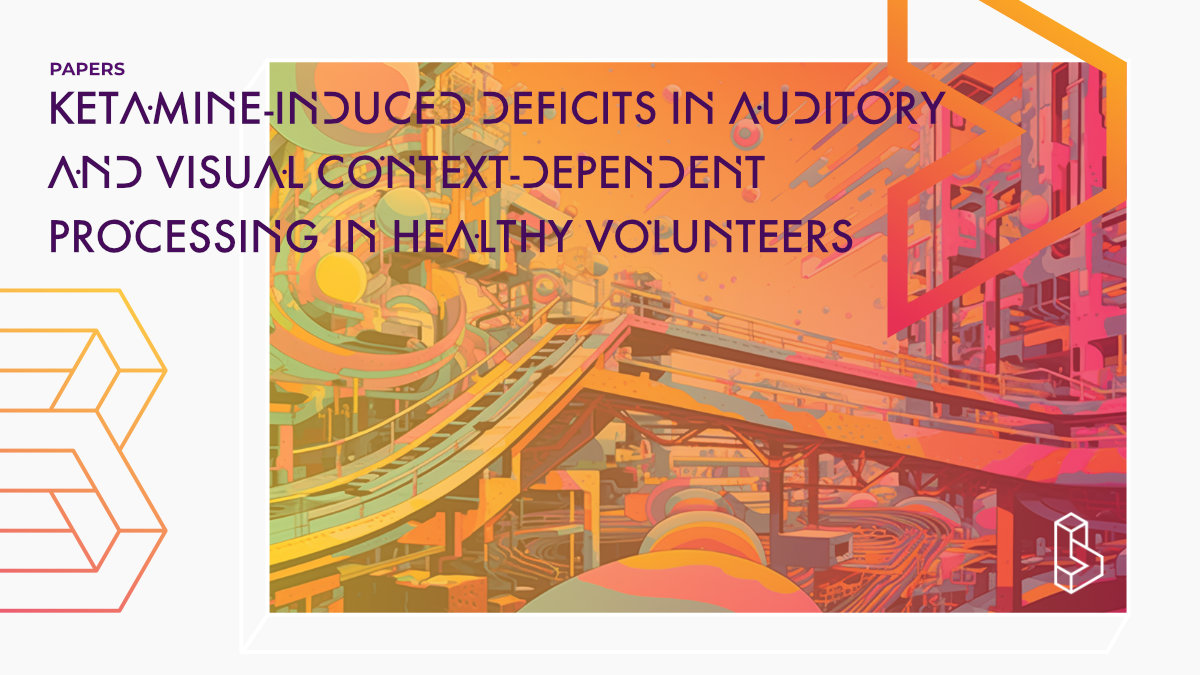This single-blind, placebo-controlled experiment (n=20) showed how ketamine decreased mismatch negativity (MMN), offering insights into how this neurological system may influence information processing in schizophrenia.
Abstract of Ketamine-induced deficits in auditory and visual context-dependent processing in healthy volunteers
“Background: In patients with schizophrenia, deficient generation of mismatch negativity (MMN)—an event-related potential (ERP) indexing auditory sensory (“echoic”) memory—and a selective increase of “context-dependent” (“BX”) errors in the “A-X” version of the Continuous Performance Test (AX-CPT) indicate an impaired ability to form and use transient memory traces. Animal and human studies implicate deficient N-methyl-D-aspartate receptor (NMDAR) functioning in such abnormalities. In this study, the effects of the NMDAR antagonists ketamine on MMN generation and AX-CPT performance were investigated in healthy volunteers to test the hypothesis that NMDARs are critically involved in human MMN generation and to assess the nature of ketamine-induced deficits in AX-CPT performance.
Methods: In a single-blind, placebo-controlled study, 20 healthy volunteers underwent an infusion with subanesthetic doses of ketamine. The MMN-to-pitch and MMN-to-duration deviants were obtained while subjects performed an AX-CPT.
Results: Ketamine significantly decreased the peak amplitudes of the MMN-to-pitch and MMN-to-duration deviants by 27% and 21%, respectively. It induced performance deficits in the AX-CPT characterized by decreased hit rates and specific increases of errors (BX errors), reflecting a failure to form and use transient memory traces of task-relevant information.
Conclusions: The NMDARs are critically involved in human MMN generation. Deficient MMN in schizophrenia thus suggests deficits in NMDAR-related neurotransmission. N-methyl-D-aspartate receptor dysfunction may also contribute to the impairment of patients with schizophrenia in forming and using transient memory traces in more complex tasks, such as the AX-CPT. Thus, NMDAR-related dysfunction may underlie deficits in transient memory at different levels of information processing in schizophrenia.”
Authors: Daniel Umbricht, Liselotte Schmid & Rene Koller
Summary of Ketamine-induced deficits in auditory and visual context-dependent processing in healthy volunteers
Deficient N-methyl-D-aspartate (NMDAR) – dependent neurotransmission may contribute to cognitive deficits in schizophrenia, including deficits in transient memory and impaired performance in tasks that tax transient maintenance of information.
Find this paper
https://doi.org/10.1001/archpsyc.57.12.1139
Open Access | Google Scholar | Backup | 🕊
Cite this paper (APA)
Umbricht, D., Schmid, L., Koller, R., Vollenweider, F. X., Hell, D., & Javitt, D. C. (2000). Ketamine-induced deficits in auditory and visual context-dependent processing in healthy volunteers: implications for models of cognitive deficits in schizophrenia. Archives of general psychiatry, 57(12), 1139-1147.
Study details
Compounds studied
Ketamine
Topics studied
Schizophrenia
Study characteristics
Placebo-Controlled
Single-Blind
Randomized
Participants
20
Humans

